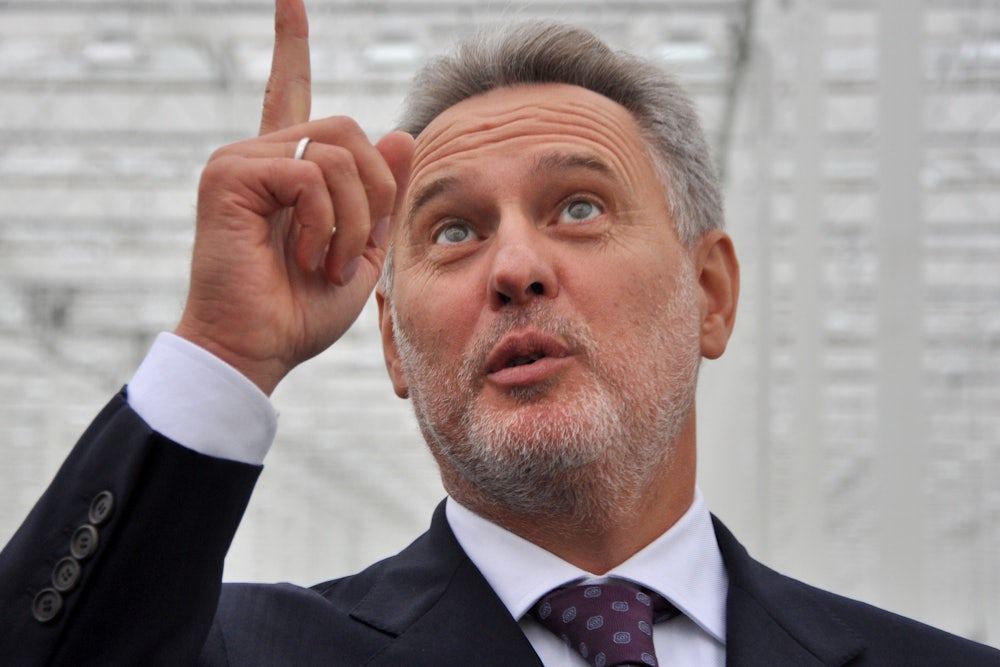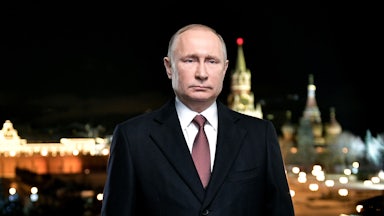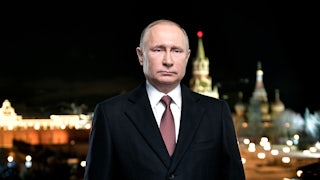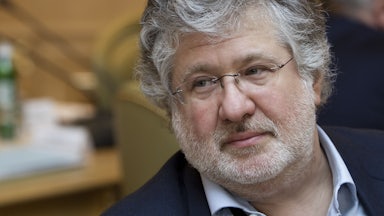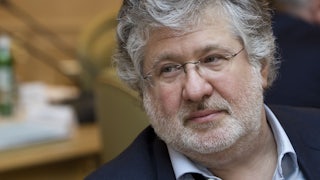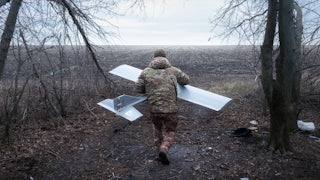As Russia continues to flail in Ukraine, a cast of familiar figures are attempting to suddenly rebrand themselves as alleged pro-Western forces on the right side of the fight: the oligarchs. Yes, the former parasitic figures who helped gut Ukraine over the past few decades, often acting as foot-soldiers for the Kremlin, are supposedly now extremely interested in upholding Ukrainian democracy and Ukrainian sovereignty.
Naturally, opportunists are going to opportune. Given the way the war’s gone thus far, the oligarchs can read the tea leaves about Ukraine’s success. But in suddenly claiming the mantle of patriotism, these grifters have gained new allies: a range of Western media outlets that are apparently willing to help whitewash these oligarchs’ reputations—and potentially help launch them back into power in a postwar Ukraine, regardless of the consequences.
One of the most glaring examples of these oligarchs suddenly spinning themselves into supposed patriots came last week, when CNN sat down with Dmitro Firtash. According to CNN, Firtash is an “oil baron” simply seeking to use his fortune for Ukraine’s ultimate benefit. The oligarch “unleash[ed his] vast wealth to fight Putin,” CNN’s headline blared, calling him a “major contributor to the war effort against Russia.”
This would be news to anyone even tangentially familiar with Firtash’s career. Arguably Ukraine’s most notorious oligarch, Firtash has been waiting for extradition to the United States for nearly a decade on bribery-related charges, stuck in Austria since 2014 under house arrest. Firtash has been dubbed an “upper-echelon [associate] of Russian organized crime” by the Justice Department, and leaked cables from the State Department revealed that he admitted to previous meetings with high-ranking Russian mobsters, gaining their permission to establish a range of businesses in the region. Indeed, Firtash’s links to Russia are impossible to miss. Last year Ukrainian President Volodomyr Zelenskiy specifically sanctioned Firtash, with Ukraine’s National Security Council further accusing him of providing titanium used by the Russian military. He is, as The Washington Post described him in 2019, a “Putin ally.” And lest we forget, Firtash played a key role in Donald Trump’s efforts to dig up so-called “dirt” on then-candidate Joe Bien.
But Firtash is also adept at using Western institutions to launder his own reputation. Most memorably, Firtash bankrolled Cambridge University’s Ukrainian Studies Program. (The oligarch’s “generous benefaction” has “opened up new possibilities” for students, Cambridge announced.) All of which makes his efforts to transform himself into some kind of supposed Ukrainian patriot that much more oblique—and that much more cynical.
It’s a transformation we can watch play out in real time, thanks to filings with the DOJ’s Foreign Agents Registration Act, or FARA, database. Having hired Democratic public relations strategist Lanny Davis—a man who, as Isaac Chotiner wrote, has an “excessive love for dictators”—recent filings claim that Firtash is “taking every step he can to do whatever possible to protect Ukrainian sovereignty, Ukraine’s democratically elected government, and his fellow Ukrainian citizens.” You can even see Firtash’s P.R. representatives working behind the scenes to pressure journalists into providing more positive coverage of their oligarchic client. The efforts are all part of Firtash’s broader scheme to avoid extradition to the U.S.—an outcome that, perhaps more than anything else, terrifies oligarchs around the region.
Yet Firtash is hardly the only Ukrainian oligarch who’s turned to American media to try to shed their bad reputation and carve out a place for themselves in the new, emerging Ukraine. A few weeks after the war first broke out, Ukrainian oligarch Victor Pinchuk penned an op-ed in The Wall Street Journal calling for greater Western support for Ukraine. According to the article, Pinchuk was a “Ukrainian industrialist and philanthropist,” interested simply in calling for increased support to beat back a Russian invasion.
Unsurprisingly, the piece itself didn’t bother to mention Pinchuk’s seminal role in setting the stage for the Russian invasion in the first place, especially when it came to working with lobbyist Paul Manafort and strengthening the pro-Russian regime of Viktor Yanukovych. According to both court testimony and documents filed with the FARA database, Pinchuk used a series of offshore accounts to pay an American law firm, Skadden Arps, to write a report effectively absolving Yanukovych of turning Ukrainian courts against his political enemies. The fallout from the report—which helped Yanukovych strengthen his rising autocracy—was a convoluted, sordid mess and resulted in some of the most prominent FARA-related charges in recent years. The entire affair also highlighted how American law firms have become the best friends that budding autocrats could ask for.
But the funding of the report was never itself in doubt. As court testimony detailed, the millions that Skadden Arps made to whitewash Yanukovych came from one figure in particular: Pinchuk. Skadden Arps partner Gregory Craig testified that Pinchuk paid the law firm “most of the $4.6 million fee,” according to The Kyiv Post. Politico added that Doug Schoen, an American pollster who initially connected Skadden to the Yanukovych regime, testified that “most of the bill … was secretly paid for” by Pinchuk. The New York Times confirmed the contours of this secret payment scheme, writing that Pinchuk “was footing the bill for the Skadden lawyers” (and pointing out that the agreement was signed by Craig and Manafort “over breakfast at Mr. Pinchuk’s palatial home”). Filings in the FARA database further reveal that Skadden “understood that its work was to be largely funded by Victor Pinchuk,” with emails between Craig and Manafort talking about how Pinchuk (referred to as “Business Person-1” in the filings) wanted his role in the report kept anonymous. (Despite all evidence to the contrary, Pinchuk denied he had anything to do with funding the report.)
Like Firtash, Pinchuk is no stranger to using Western institutions to launder his reputation. He’s firmly enmeshed in Washington’s think tank nexus, where he uses his foundation to donate significant sums to both the Brookings Institution and the Atlantic Council—even joining the latter’s International Advisory Board. Like other oligarchs, Pinchuk has also provided significant funds across the American political spectrum, from paying then-candidate Donald Trump to appear at a Ukrainian conference to giving millions to the Clinton Foundation.
It’s all part and parcel of these oligarchs’ larger strategy: to establish a safe (and profitable) perch for themselves in an emerging Ukraine, with their reputations newly spit shined by a credulous media. Should their campaign succeed, it raises the risk of the West repeating many of the mistakes it made decades ago, when it first began helping oligarchs run rampant across the region. It’s a mistake the West, and Ukraine, can ill afford to make again: While Ukraine will remain on a firmly pro-Western trajectory after this war, it’s clear that Western media—and Western think tanks and law firms and politicians alike—need to finally realize that there is no such thing as a pro-Western oligarch.
